【学习实践】Unit 4 Don’t eat in class.知识点归纳
- 格式:doc
- 大小:15.00 KB
- 文档页数:4

4-Don’t-eat-in-class知识点总结eat in class1、重点词组及短语1、school rules 学校规章制度17、 share (sth、)with sb、和某人分享2、 break the rules 违反规章制度18、 make (up)ruler 制订规则3、 fallow/keep the rules 遵守规章制度19、 learn to do sth、学(做某事)4、 arrive late for class = be late for class 上课迟到20、 on school days在上学期间5、 dining hall饭厅,餐厅21、on school nights在校期间的晚上6、 in class 在课堂上22、 practice (playing)the piano 练习弹钢琴7、 on time准时(in time及时)23、 go out外出8、 eat in the classroom 在教室里吃东西24、 see friends看望朋友9、 wear a hat (hats)戴帽子25、 clea n (one’s)room打扫房间10、 listen to music 听音乐26、 do the dishes洗餐具11、school uniforms校服27、 too many/much太多的(可数/不可数 ) 12、 wear uniforms穿制服28、make (one’s)bed铺床13、 I see我明白了29、 go to bed去睡觉(be in bed 在床上)14、 have to do sth、不得不做30、 think about=think of 考虑、认为15、 be(keep)quiet保持安静31、be strict (with sb、)对某人)要求严格16、 according to根据,依据32、 Dont talk、 = No talking、不要说话2、知识点解析1、Don’t fight、不要打架。
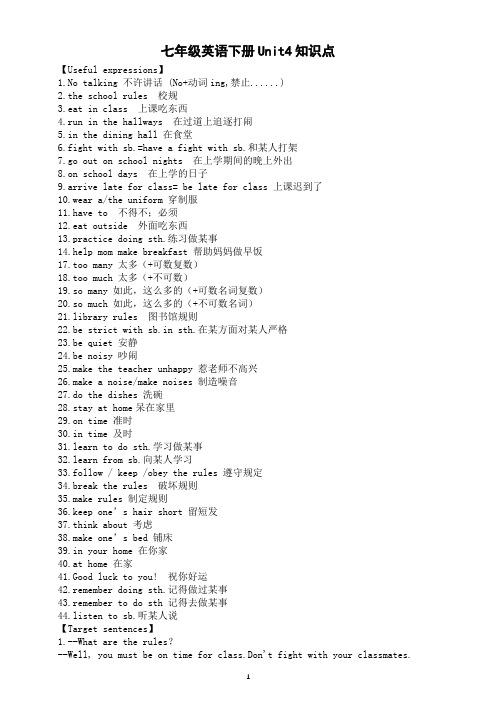
七年级英语下册Unit4知识点【Useful expressions】1.No talking 不许讲话 (No+动词ing,禁止......)2.the school rules 校规3.eat in class 上课吃东西4.run in the hallways 在过道上追逐打闹5.in the dining hall 在食堂6.fight with sb.=have a fight with sb.和某人打架7.go out on school nights 在上学期间的晚上外出8.on school days 在上学的日子9.arrive late for class= be late for class 上课迟到了10.wear a/the uniform 穿制服11.have to 不得不;必须12.eat outside 外面吃东西13.practice doing sth.练习做某事14.help mom make breakfast 帮助妈妈做早饭17.too many 太多(+可数复数)18.too much 太多(+不可数)19.so many 如此,这么多的(+可数名词复数)20.so much 如此,这么多的(+不可数名词)21.library rules 图书馆规则22.be strict with sb.in sth.在某方面对某人严格23.be quiet 安静24.be noisy 吵闹25.make the teacher unhappy 惹老师不高兴26.make a noise/make noises 制造噪音27.do the dishes 洗碗28.stay at home呆在家里29.on time 准时30.in time 及时31.learn to do sth.学习做某事32.learn from sb.向某人学习33.follow / keep /obey the rules 遵守规定34.break the rules 破坏规则35.make rules 制定规则36.keep one’s hair short 留短发37.think about 考虑38.make one’s bed 铺床39.in your home 在你家40.at home 在家41.Good luck to you! 祝你好运42.remember doing sth.记得做过某事43.remember to do sth 记得去做某事44.listen to sb.听某人说【Target sentences】1.--What are the rules?--Well, you must be on time for class.Don't fight with your classmates.2.We can’t listen to music in the classroom or hallways.3.--Can we bring music players to school?--Yes, we can./No, we can’t.4.And we always have to wear the school uniform.5.--Does he have to wear a uniform at school?--Yes, he does./No, he doesn't.6.--What do you have to do?--We have to be quiet in the library.7.Don't leave the dirty dishes in the kitchen.8.My dad says I can’t play basketball after school because I must do my homework.9.After dinner, I can’t relax,either.I must read a book before I can watch TV.10.I know how you feel.11.There are a lot of things you can do.12.Parents and schools are sometimes strict but remember, they make rules to help us.13.I think it’s best to follow the rules.14.I can’t go out on school nights.15.I have to do my homework after school.16.I must practice the guitar before dinner.【Language points】1.Don’t arrive late for class.(1)arrive v.到达;是不及物动词,若接地点名词,要加介词in或at。
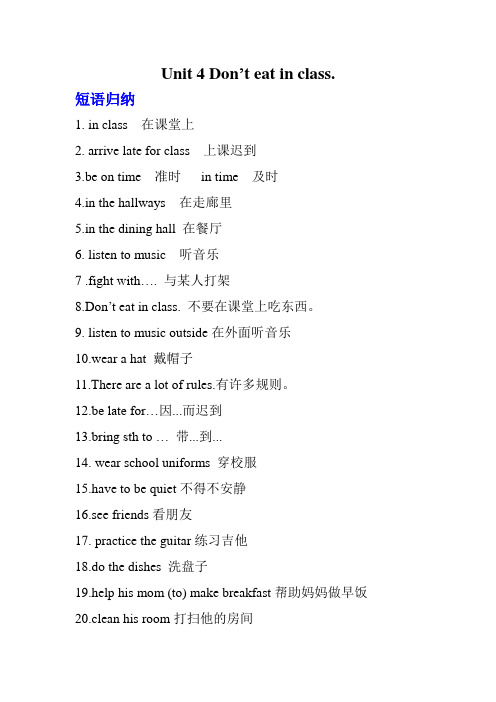
Unit 4 Don’t eat in class.短语归纳1. in class 在课堂上2. arrive late for class 上课迟到3.be on time 准时in time 及时4.in the hallways 在走廊里5.in the dining hall 在餐厅6. listen to music 听音乐7 .fight with…. 与某人打架8.Don’t eat in class. 不要在课堂上吃东西。
9. listen to music outside在外面听音乐10.wear a hat 戴帽子11.There are a lot of rules.有许多规则。
12.be late for…因...而迟到13.bring sth to … 带...到...14. wear school uniforms 穿校服15.have to be quiet不得不安静16.see friends看朋友17. practice the guitar练习吉他18.do the dishes 洗盘子19.help his mom (to) make breakfast帮助妈妈做早饭20.clean his room打扫他的房间21.before dinner晚饭后22.too many rules太多规则too many+可数名词“太多...”too much+不可数名词“太多...”much too +形容词“太...”23make your bed整理床铺24.after breakfast早饭后25.leave sth in+地点留..….在某处26.b e noisy太闹/be quiet安静的27.t ell sb. to do sth告诉某人做某事28.t hink about 考虑29.on weekends在周末=on the weekend30.be strict with sb. 对某人严格要求be strict in sth. 对某事要求严格31.remember to do sth. 记住做某事remember doing sth. 记住做过某事32.make rules to do sth. 制定规则做某事33.follow the rules遵守规则break the rules 违反规则34.keep my hair short 保持头发短keep +形容词keep healthy/happy35.h ave fun/enjoy/have a good time/have a good trip doing sth.做某事有趣句型归纳1. Don’t eat in class.2. Don’t arrive late for class,and you must be on time.3. Don’t run in the hallways.4. Don’t eat in the classroom. You must eat in the dining hall.5. Don’t listen to music in class.6.-Can we listen to music,Cindy?-We can’t listen to music in the hallways but we can listen to it outside.7.Get up now and make your bed.8.Don’t leave the dirty dishes in the kitchen.语法祈使句的形式(1)肯定祈使句的形式:(2)否定祈使句的形式:①Do型和Be型的否定式都是在句首加don’t(若句首有please,则在please后加don’t)。
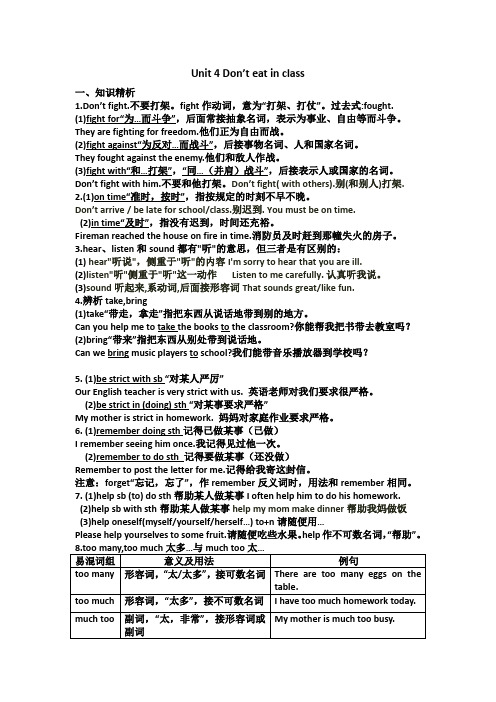
Unit 4 Don’t eat in class一、知识精析1.Don’t fight.不要打架。
fight作动词,意为“打架、打仗”。
过去式:fought. (1)fight for“为…而斗争”,后面常接抽象名词,表示为事业、自由等而斗争。
They are fighting for freedom.他们正为自由而战。
(2)fight against“为反对…而战斗”,后接事物名词、人和国家名词。
They fought against the enemy.他们和敌人作战。
(3)fight with“和…打架”,“同…(并肩)战斗”,后接表示人或国家的名词。
Don’t fight with him.不要和他打架。
Don’t fight( with others).别(和别人)打架.2.(1)on time“准时,按时”,指按规定的时刻不早不晚。
Don’t arrive / be late for school/class.别迟到. You must be on time.(2)in time“及时”,指没有迟到,时间还充裕。
Fireman reached the house on fire in time.消防员及时赶到那幢失火的房子。
3.hear、listen和sound都有"听"的意思,但三者是有区别的:(1) hear"听说",侧重于"听"的内容I'm sorry to hear that you are ill.(2)listen"听"侧重于"听"这一动作Listen to me carefully. 认真听我说。
(3)sound听起来,系动词,后面接形容词That sounds great/like fun.4.辨析take,bring(1)take“带走,拿走”指把东西从说话地带到别的地方。

Unit 4 Don’t eat in class.1.短语归纳2.典句必背3.用法集萃(1)Don’t arrive late for class. 不要上课迟到❖arrive in❖arrive at(2)You must be on time. 你必须准时。
❖on time是固定搭配,意为“按时;准时”。
例:Don’t worry. The train will arrive on time. 别担心。
火车会准时到达的。
❖常见的time短语(3)Don’t listen to music in class. 不要上课时听音乐牛刀小试—Do you like the songs by Taylor?一Yes. Country music ______ nice and full of feelings.A. SoundsB.listensC. hearsD. looks(4)This is very important. 这是很重要的❖important作形容词,意为“重要的”。
如:The first lesson is very important. 第一课是很重要的❖反义词:unimportant adj. 不重要的❖派生词:importance n. 重要;重要性(5)Can we bring music players to school? 我们可以把音乐播放器带到学校里来吗?❖bring作动词,意为“带来;拿来”例:Don’t forget to bring your homework here. 不要忘记把你的家庭作业带过来❖辨析bring, take, carry和get牛刀小试Don’t forget _____ your photos here when you come to school.A.bringingB. to takeC. takingD. to bring(6)Oh, and we also have to be quiet in the library. 哦,我们在图书馆里还必须保持安静❖quiet作形容词,意为“安静的”,可以用来修饰人,也可以用来形容地点或场所等。
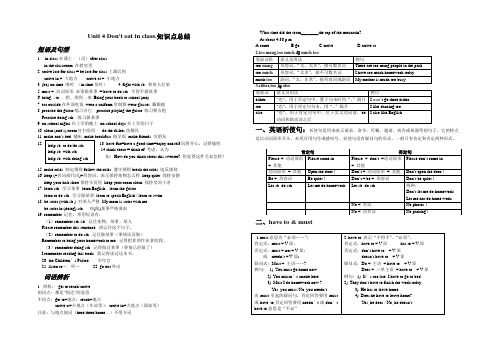
Unit 4 Don't eat in class.知识点总结短语及句型:1.in class 在课上(反)after classin the classroom 在教室里2. arrive late for class = be late for class上课迟到arrive in + 大地方arrive at + 小地方3. (be) on time 准时(in time及时)4. fight with sb. 和某人打架5. must + 动词原形必须做某事= have to do sth. 不得不做某事6. bring…to…把…带到…来Bring your book to school (me).7. eat outside 在外面吃饭wear a uniform 穿制服wear glasses 戴眼镜8. practice the guitar 练习吉它practice playing the guitar 练习弹吉他Practice doing sth 练习做某事9. on school nights在上学的晚上on school days在上学的日子10. clean (one’s) room打扫房间do the dishes洗餐具做早饭make friends 交朋友12. 13..have fun=have a good time=enjoy oneself玩得开心,过得愉快14.think about = think of 考虑、认为如:How do you think about this sweater? 你觉得这件毛衣怎样?15. make rules 制定规则follow the rules 遵守规则break the rules 违反规则16. keep (+名词或代词)+形容词,表示保持某物怎么样keep quiet 保持安静keep your hair short保持头发短keep your room clean 保持房间干净17. learn sth. 学习某事learn English learn the guitarlearn to do sth. 学习做某事learn to speak English / learn to swim18. be strict (with sb.) 对某人严格My mom is strict with me.be strict in (doing) sth 对(做)某事严格要求19. remember 记住,常用短语有:(1)remember sth./sb. 记住某物、某事、某人Please remember this sentence. 请记住这个句子。

Unit 4 Don’t eat in class.1.祈使句的构成和用法概念:祈使句是用来表示请求、命令、叮嘱、邀请、劝告等的句子。
结构:祈使句一般以动词原形开头,句末用句号或感叹号。
a)Do型祈使句肯定结构:动词原形+宾语+其它否定结构:Don’t+动词原形+宾语Open the door.开门Don’t play soccer in the classroom.不要在教室里踢足球。
b)Be型祈使句肯定结构:Be+表语否定结构:Don’t+be+表语Be careful next time!下次要细心!Don’t be late for school.上学不要迟到。
c)Let型祈使句肯定结构:Let+宾语+动词原形+其它否定结构:Don’t+let+宾语+动词原形+其它Let’s not+动词原形+其它Let’s go home.我们回家吧。
Don’t let him go shopping.不要让他去购物。
d)No型祈使句结构:No+动词ing 或No+名词。
这种结构的祈使句一般用来表示禁止。
No talking禁止讲话(=Don’t talk=Stop talking)No photos禁止拍照(=Don’t take photos)2.短语go out外出(娱乐)You can’t go out on school nights.在上学的晚上你不能出去(玩)。
take out掏出,取出Please take out a piece of paper.请拿出一张纸。
do the dishes=wash the dishes清洗餐具Please wash the dishes after dinner.晚饭后请清洗餐具。
think about sth考虑Let’s think about the fruit and vegetables.让我们考虑一下水果和蔬菜。
have fun=have a good time玩得高兴Have fun.玩得开心!good luck(to sb)祝(某人)好运Wish you good luck.=Good luck to you.祝你好运。

Unit 4 Don’t eat in class知识点讲解一、知识点解析1.Don’t fight.不要打架。
fight作动词,意为“打架、打仗”。
其过去式为fought.●fight for“为…而斗争”,后面常接抽象名词,表示为事业、自由等而斗争。
Eg:They are fighting for freedom.他们正为自由而战。
●fight against“为反对…而战斗”,后接事物名词、人和国家名词。
Eg: They fought against the enemy.他们和敌人作战。
●fight with“和…打架”,“同…(并肩)战斗”,后只接表示人或国家的名词。
Eg:Don’t fight with him.不要和他打架。
【典型例题】They fought ________the Italians in the last war,but________them in this war.A. with; withB. with;forC. against ; againstD.with; against3. 辨析:get to/reach/arrive相同点:都是“到达“的意思不同点:get to+地点;reach+地点arrive at+小地点(车站等);arrive in+大地点(国家等)注意:●get to与地点副词(here/there/home…)不用介词toEg:I want to go to Beijing.I got home at 15:00.我下午三点到的家。
●arrive是不及物动词,后面若接地点名词则要和in/at连用,接地点副词时则不用介词。
Eg: I arrived home at 15:00. =I got home at 15:00.He arrived in Shanghai yesterday.他昨天到的上海。
He arrived yesterday.他昨天到的。
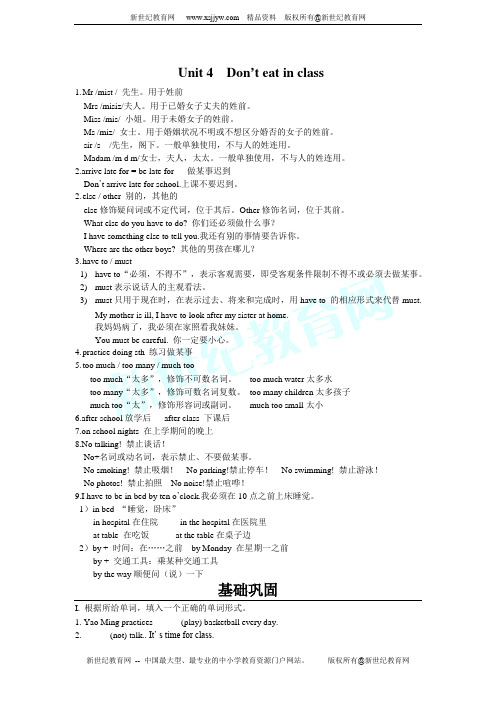
Unit 4 Don’t eat in class1.Mr /mist / 先生。
用于姓前Mrs /misiz/夫人。
用于已婚女子丈夫的姓前。
Miss /mis/ 小姐。
用于未婚女子的姓前。
Ms /miz/ 女士。
用于婚姻状况不明或不想区分婚否的女子的姓前。
sir /s /先生,阁下。
一般单独使用,不与人的姓连用。
Madam /m d m/女士,夫人,太太。
一般单独使用,不与人的姓连用。
2.arrive late for = be late for 做某事迟到Don’t arrive late for school.上课不要迟到。
2.else / other 别的,其他的else修饰疑问词或不定代词,位于其后。
Other修饰名词,位于其前。
What else do you have to do? 你们还必须做什么事?I have something else to tell you.我还有别的事情要告诉你。
Where are the other boys? 其他的男孩在哪儿?3.have to / must1)have to“必须,不得不”,表示客观需要,即受客观条件限制不得不或必须去做某事。
2)must表示说话人的主观看法。
3)must只用于现在时,在表示过去、将来和完成时,用have to 的相应形式来代替must.My mother is ill, I have to look after my sister at home.我妈妈病了,我必须在家照看我妹妹。
You must be careful. 你一定要小心。
4.practice doing sth 练习做某事5.too much / too many / much tootoo much“太多”,修饰不可数名词。
too much water太多水too many“太多”,修饰可数名词复数。
too many children太多孩子much too“太”,修饰形容词或副词。

七年级英语下册Unit4 Don’t eat in class?重要知识点汇总七年级英语下册Unit4 Dn’t eat in lass?重要知识点汇总Unit4 Dn’t eat in lass【重点单词】rule n规则;规arrive v到达(be) n tie 准时halla n走廊;过道hall n大厅;礼堂dining hall 餐厅listen v听;倾听listen t… 听……fight v ≈n打架;战斗srr ad抱歉的;难过的;惋惜的utside adv在外面ad 外面的ear v穿;戴iprtant ad重要的bring v带;取unifr n校服;制服quiet ad安静的ut adv外出g ut 外出(娱乐)pratie v≈ n练习dish n碟;盘d the dishes 清洗餐具befre prep n在… 以前adv以前ae (ne’s) bed 铺床dirt ad脏的ithen n厨房re ad prn更多的nis ad吵闹的relax v放松;休息read v读;阅读terrible ad非常讨厌的;可怕的feel v感受;觉的strit ad严格的;严厉的be strit (ith sb) (对某人)要求严格reeber v记住;记起fll v遵循;跟随fll the rules 遵守规则lu n幸运;运气eep v保持;保留hair n头发;毛发learn v 学习;学会【重点短语】1 Dn’t eat in lass 在堂上2 arrive late fr lass 上迟到3 be n tie 准时4in the hallas 在走廊里in the dining hall 在餐厅6 listen t usi 听音乐7 fight ith… 与某人打架8Dn’t eat in lass 不要在堂上吃东西。
9 listen t usi utside 在外面听音乐10 ear a hat 戴帽子11 There are a lt f rules 有许多规则。
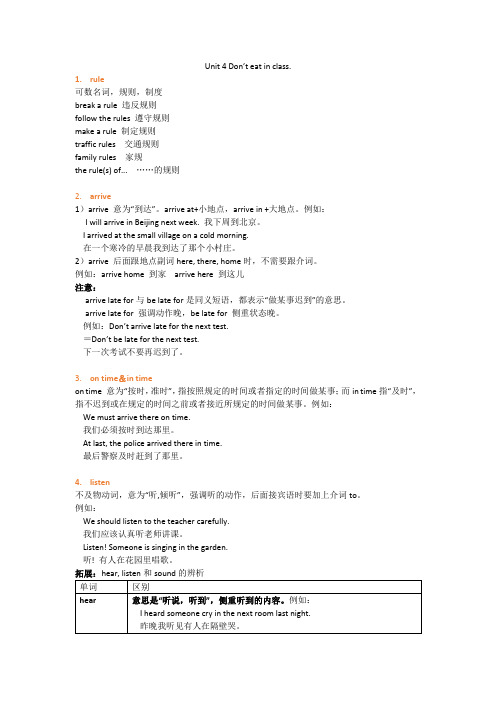
Unit 4 Don’t eat in class.1.rule可数名词,规则,制度break a rule 违反规则follow the rules 遵守规则make a rule 制定规则traffic rules 交通规则family rules 家规the rule(s) of... ……的规则2.arrive1)arrive 意为“到达”。
arrive at+小地点,arrive in +大地点。
例如:I will arrive in Beijing next week. 我下周到北京。
I arrived at the small village on a cold morning.在一个寒冷的早晨我到达了那个小村庄。
2)arrive 后面跟地点副词here, there, home时,不需要跟介词。
例如:arrive home 到家arrive here 到这儿注意:arrive late for与be late for是同义短语,都表示“做某事迟到”的意思。
arrive late for 强调动作晚,be late for 侧重状态晚。
例如:Don’t arrive late for the next test.=Don’t be late for the next test.下一次考试不要再迟到了。
3.on time&in timeon time 意为“按时,准时”,指按照规定的时间或者指定的时间做某事;而in time指“及时”,指不迟到或在规定的时间之前或者接近所规定的时间做某事。
例如:We must arrive there on time.我们必须按时到达那里。
At last, the police arrived there in time.最后警察及时赶到了那里。
4.listen不及物动词,意为“听,倾听”,强调听的动作,后面接宾语时要加上介词to。
例如:We should listen to the teacher carefully.我们应该认真听老师讲课。

1.on time 按时—按规定的时间或指定的时间做某事。
in time 及时—不迟到或在规定之间之前或接近所规定的时间做某事。
2.arrive vi.arrive in +大地方arrive at +小地方reach (vt)+地点名get (vi.) to +地点名3.listen to 听…(强调动作)hear 听(强调结果)4.in class 在课堂上after class 课下in hospital 住院in the hospital 在医院里at table 吃饭at the table 在桌子旁5.be late for 迟到6.fight with ―与某人打架‖have a fight ―打架‖7.have to 不得不,必须(强调客观状况)must +动词原形(强调主观看法)8.be quiet= keep quiet be + 形容词(祈使句的一种)9.Ms. ―女士‖---对婚姻状况不明的女子的称呼。
Mrs. ―夫人,太太‖---用于已婚女子丈夫的姓氏之前。
Miss. ―小姐‖---用于未婚女子的姓氏之前Mr. ―先生‖---用于一切男子(不论婚否)的姓氏前。
10.go out 出去(参加社交活动,外出交际或娱乐)11.outside ---inside(1)adj. example: Outside workers need warm clothes in winter.(2)adv. example: Let’s go outside to play.(3)Prep. example: There is a new car outside the house.(4)n. example: The outside of the house is white.12.do the dishes=wash the dishes 洗餐具13.make breakfast make the/one’s bed make dumplings make a noise makefriends make rules14.wear vt. 强调穿的状态。
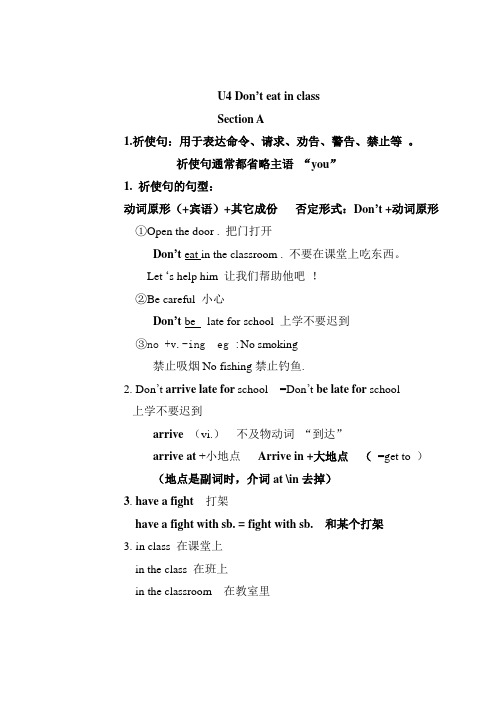
U4 Don’t eat in classSection A1.祈使句:用于表达命令、请求、劝告、警告、禁止等。
祈使句通常都省略主语“you”1. 祈使句的句型:动词原形(+宾语)+其它成份否定形式:Don’t +动词原形①Open the door . 把门打开Don’t eat in the classroom . 不要在课堂上吃东西。
Let ‘s help him 让我们帮助他吧!②Be careful 小心Don’t be late for school 上学不要迟到③no +v.-ing eg :No smoking禁止吸烟No fishing禁止钓鱼.2.Don’t arrive late for school =Don’t be late for school上学不要迟到arrive(vi.)不及物动词“到达”arrive at +小地点Arrive in +大地点(=get to )(地点是副词时,介词at \in去掉)3. have a fight 打架have a fight with sb. = fight with sb. 和某个打架3.in class 在课堂上in the class 在班上in the classroom 在教室里5. outside adv. prep.eg: listen to music outside (adv.) 在外面听音乐Eat outside 在外面吃listen to music outside the classroom (prep.)在教室外面听音乐6.wear 穿着,戴着(表示穿的状态)put on 穿(表示穿的动作)wear a hat \glasses 戴着帽子\眼镜wear a new coat穿着夹克dress sb\ oneself 给某人穿衣服7.listen ( vi. ) listen to +宾语8. It’s my first day at school. 这是我上学的第一天。
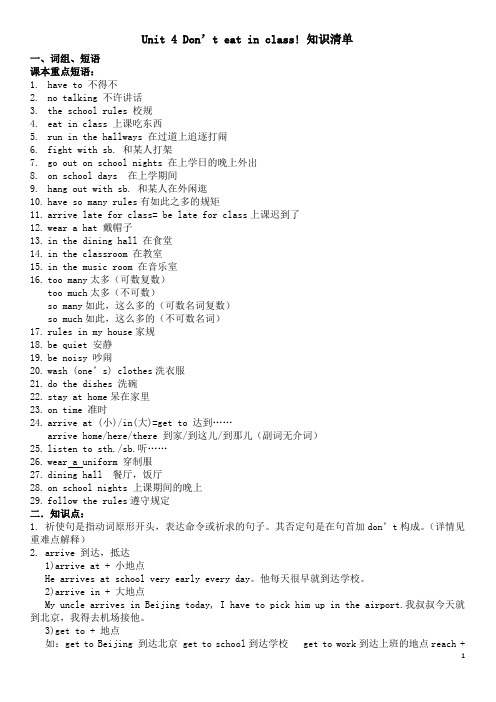
Unit 4 Don’t eat in class!知识清单一、词组、短语课本重点短语:1.have to 不得不2.no talking 不许讲话3.the school rules 校规4.eat in class 上课吃东西5.run in the hallways 在过道上追逐打闹6.fight with sb. 和某人打架7.go out on school nights 在上学日的晚上外出8.on school days 在上学期间9.hang out with sb. 和某人在外闲逛10.have so many rules有如此之多的规矩11.arrive late for class= be late for class上课迟到了12.wear a hat 戴帽子13.in the dining hall 在食堂14.in the classroom 在教室15.in the music room 在音乐室16.too many太多(可数复数)too much太多(不可数)so many如此,这么多的(可数名词复数)so much如此,这么多的(不可数名词)17.rules in my house家规18.be quiet 安静19.be noisy 吵闹20.wash (one’s) clothes洗衣服21.do the dishes 洗碗22.stay at home呆在家里23.on time 准时24.arrive at (小)/in(大)=get to 达到……arrive home/here/there 到家/到这儿/到那儿(副词无介词)25.listen to sth./sb.听……26.wear a uniform 穿制服27.dining hall 餐厅,饭厅28.on school nights 上课期间的晚上29.follow the rules遵守规定二.知识点:1. 祈使句是指动词原形开头,表达命令或祈求的句子。
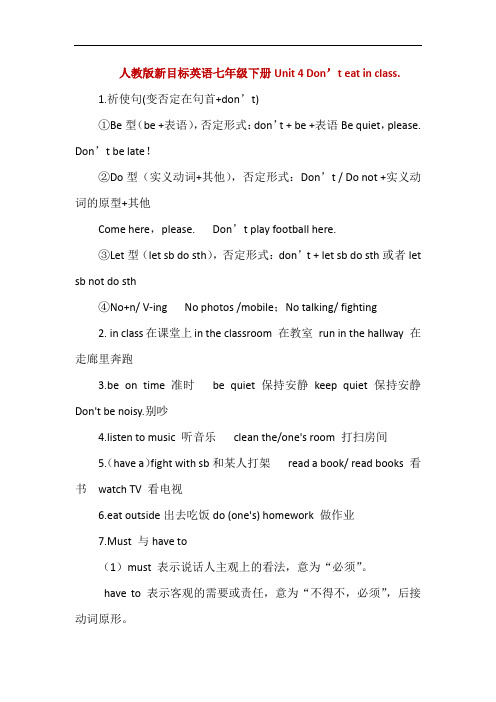
人教版新目标英语七年级下册Unit 4 Don’t eat in class.1.祈使句(变否定在句首+don’t)①Be型(be +表语),否定形式:don’t + be +表语Be quiet,please. Don’t be late!②Do型(实义动词+其他),否定形式:Don’t / Do not +实义动词的原型+其他Come here,please. Don’t play football here.③Let型(let sb do sth),否定形式:don’t + let sb do sth或者let sb not do sth④No+n/ V-ing No photos /mobile;No talking/ fighting2. in class在课堂上in the classroom 在教室run in the hallway 在走廊里奔跑3.be on time准时be quiet 保持安静keep quiet 保持安静Don't be noisy.别吵4.listen to music 听音乐clean the/one's room 打扫房间5.(have a)fight with sb和某人打架read a book/ read books 看书watch TV 看电视6.eat outside出去吃饭do (one's) homework 做作业7.Must 与have to(1)must 表示说话人主观上的看法,意为“必须”。
have to 表示客观的需要或责任,意为“不得不,必须”,后接动词原形。
(2)must没有人称,时态和数的变化。
have to 有人称,数,时态的变化,其第三人称单数形式为has to ,构成否定句或疑问句时借助动词do/ does。
(3)have to的否定式是needn’t=don’t / doesn’t have to (不必要);must的否定式是must not/ mustn’t(一定不能,不允许)。

Unit 4 Don’t eat in class.知识点归纳Unit4Don’teatinclass.知识点归纳一、重点短语1.schoolrules校规2.haveto不得不;必须3.ontime准时4.intheclassroom在教室里5.inthehallways在走廊里6.arrive/belateforclass上课迟到7.listentomusic听音乐8.bequiet保持安静9.weartheschooluniform穿校服10.goout外出11.practicetheguitar训练弹吉他12.dothedishes清洗餐具13.helpsb.dosth.帮助某人做某事14.seefriends看望朋友15.onschoolnights在学习日的晚上16.onschooldays在学习日17.toomany太多21.bestrict严格要求18.makeone’sbed铺床22.followtherules遵守规则19.on/atweekends在周末23.keeptheshorthair留短发20.thinkabout考虑24.learntodo学会做......二.重点短语1.Don’truninthehallways.不要在走廊里跑。
2.—whataretherules?有什么规章制度吗?—wemustbeontimeforclass.我们上课要准时。
3.—canweeatintheclassroom?我们可以在教室吃东西吗?—No,wecan’t,butwecaneatinthedinninghall.不,不可以,但我们可以在餐厅吃。
4.Doeshehavetowearauniformatschool?他在学校必须穿校服吗?5.—whatdoyouhavetodo?你不得不做什么?—wehavetobequietinthelibrary.在图书馆,我们必须要保持安静。
![[K12学习]七年级英语下册 Unit 4 Don’t eat in class短语、语法知识点汇总](https://img.taocdn.com/s1/m/4b125b77c850ad02de8041f5.png)
Unit 4 Don’t eat in class一、基础归纳【教材内容解析】Section A1.Don’t arrive late for class. (P. 19)arrive作不及物动词,表示“到达”,接宾语时,需要加上介词in或者at。
When did you arrive?We are arriving at the station at two o’clock.【拓展】reach表示“到达”时,是及物动词,后面直接接表示地点的名词作宾语。
另外两个表示“到达”的动词(get和arrive)都是不及物动词,get to+地点;arrive in/at+地点。
After a long way, they reached/got to/arrived at the top of the mountain finally.2.You must be on time. (P. 19)on time用作固定短语,表示“准时、按时”,in time表示“及时”。
The train arrives on time.The ambulance(救护车) arrives in time.3.Don’t listen to music in class. (P. 19)listen用作不及物动词,表示听的动作,后接宾语时,需要加上介词to,hear强调听的结果,表示“听到”。
This girl likes to listen to music.Can you hear anything?4.Don’t fight. (P. 19)fight此处用作动词,意为“打架”,fight with sb.意为“与某人打架”。
Why do you sometimes fight with others?5.listen to music outside (P. 20)outside表示“在外边”,反义词为inside“在……里面”。
Unit 4 Don’t eat in class.知识点归
纳
Unit4Don’teatinclass.知识点归纳
一、重点短语
1.schoolrules校规
2.haveto不得不;必须
3.ontime准时
4.intheclassroom在教室里
5.inthehallways在走廊里
6.arrive/belateforclass上课迟到
7.listentomusic听音乐
8.bequiet保持安静
9.weartheschooluniform穿校服10.goout外出11.practicetheguitar训练弹吉他12.dothedishes清洗餐具13.helpsb.dosth.帮助某人做某事14.seefriends看望朋友15.onschoolnights在学习日的晚上16.onschooldays在学习日
17.toomany太多21.bestrict严格要求
18.makeone’sbed铺床22.followtherules遵守规则
19.on/atweekends在周末23.keeptheshorthair留短发
20.thinkabout考虑24.learntodo学会做......
二.重点短语
1.Don’truninthehallways.不要在走廊里跑。
2.—whataretherules?有什么规章制度吗?
—wemustbeontimeforclass.我们上课要准时。
3.—canweeatintheclassroom?我们可以在教室吃东西吗?
—No,wecan’t,butwecaneatinthedinninghall.不,不可以,但我们可以在餐厅吃。
4.Doeshehavetowearauniformatschool?他在学校必须穿校服吗?
5.—whatdoyouhavetodo?你不得不做什么?
—wehavetobequietinthelibrary.在图书馆,我们必须要保持安静。
6.Therearetoomanyrules!有太多规则了。
7.Don’tleavethedirtydishesinthekitchen!不要把脏盘子留在厨房里。
8.Ican’trelaxeither.我也不能放松。
9.Iknowhowyoufeel.我知道你的感受。
10.Therearealotofthingsyoucando.有很多你可以做的事。
11.Ineverhaveanyfun.我从来不快乐。
12.Ihavetogettherebeforethecatgetsup.我不得不在猫起床前到达那里。
Unit5whydoyoulikepandas?知识点整理
一、重点短语
1.kindof有点儿
2.forgettodosth.忘记去做某事
3.forgetdoingsth.忘记做过某事
4.bemadeof...由......构成
5.bemadefrom...由......构成
6.sleepallday整天睡觉
7.savetheelephants拯救大象8.oneof其中之一
9.asymbolofgoodluck好运的象征
10.walkforalongtime步行很长一段时间
11.placeswithfoodandwater有食物和水的地方
12.getlost迷路
13.ingreatdanger处于巨大的危险之中14.cutdown砍倒
15.kill...for为......而
二、重点句型
1.—whydoyoulikepandas?你为什么喜欢熊猫?
—Becausetheyarekindofinteresting?因为他们有点有趣。
2.—whydoesjohnlikekoalas?约翰为什么喜欢考拉?
—Becausetheyarecute.因为他们很可爱。
3.—whydon’tyouliketigers?你为什么不喜欢老虎?
—Becausetheyarereallyscary.因为他们真的很恐怖。
4.—wherearelionsfrom?狮子从哪里来?—TheyarefromSouthAfrica.他们来自于非洲。
5.—whatanimalsdoyoulike?你喜欢什么动物?—Iliketigers.我喜欢老虎。